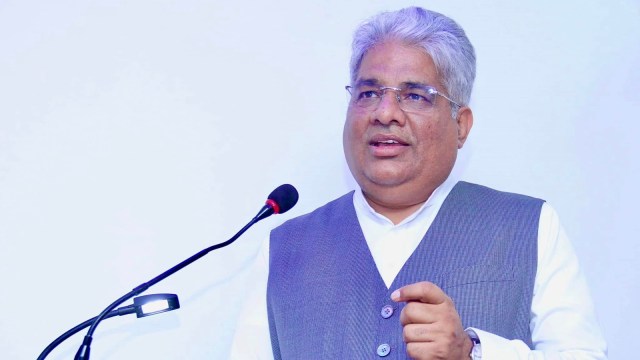Shun ‘take, make, dispose’ attitude to move towards circular economy: Bhupender Yadav
Minister for Environment, Forest and Climate Change Bhupender Yadav said on Tuesday that reuse and recycling will reduce dependence on imports and help India move towards self-reliance.
 Minister Bhupender Yadav stresses the importance of embracing a circular economy to reduce waste and create jobs. (Source: FB)
Minister Bhupender Yadav stresses the importance of embracing a circular economy to reduce waste and create jobs. (Source: FB)Minister for Environment, Forest and Climate Change Bhupender Yadav said on Tuesday that there was a need to shun the ‘take, make and dispose’ attitude, move towards recycling and reusing, and adopt the model of circular economy.
As per the Central Pollution Control Board, India generates an estimated 62 million tonnes of waste annually, and it was necessary to embrace a circular economy that will aid in reducing dependence on resource extraction and imports of raw materials, he added.
“The way production is happening in this country, we have to shun the attitude of take, make and dispose and move towards recycling and reusing. By 2050, the circular economy will be 2 trillion dollars and this will create 10 million jobs…hence circular economy is important from the view of national building. We have a big opportunity in front of us, and we can create new businesses, eco-friendly products,” said Yadav.
The ‘take, make and dispose’ approach, he said, gives way to the creation of trash. Yadav was speaking at The Recycling and Environment Association of India Conclave on Waste Recycling and Climate Change, 2025.
Speaking on the increasing demand for critical minerals and similar raw materials, Yadav said that reuse and recycling will reduce dependence and pressure on imports and help in moving towards self-reliance. Yadav said that while the government had made rules on the management of e-waste, waste tyres, used oil, battery waste and end-of-life vehicles through its mandate of policy interventions, the industry needed to focus on four aspects.
“For a circular economy, products have to be redesigned for circularity, industry has to collectively invest in advanced recycling technology, that will lead to high recovery rate of precious metals, we need to strengthen our supply chains from rag-pickers onwards, and importantly, we need to effect change in consumer behaviour,” he said.
Referring to Prime Minister Narendra Modi’s adoption of recycled clothes during the G7 summit in Hiroshima, Japan, Yadav said, “The Prime Minister had worn a jacket made of recycled material, and it was a message for all of us on the need to reduce waste. We have to make a systemic shift towards adopting alternate economic models,” he said.







